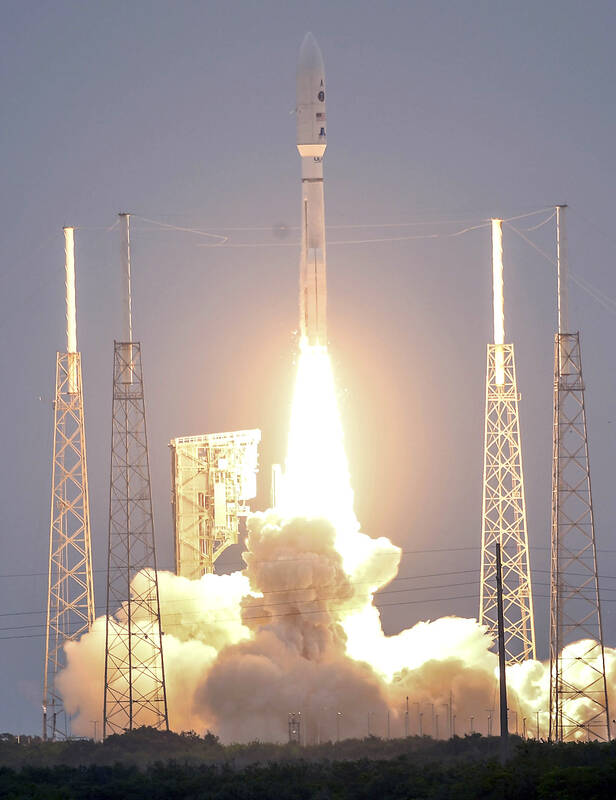US defense contractor L3Harris Technologies Inc on Sunday said it would purchase Aerojet Rocketdyne Holdings Inc in a US$4.7 billion all-cash transaction, as it looks to tap into rising demand for missiles amid the Ukraine conflict.
The offer price of US$58 per share represents a premium of 6.5 percent to Aerojet’s close on Friday.
The deal, which is expected to be completed next year, would add to L3Harris’ Space & Airborne Systems unit, which makes electronic warfare equipment and avionics sensors.

Photo: AP
Reuters last month reported that L3Harris, formed by the merger of L3 Technologies and Harris Corp in 2019, was among the companies vying to buy Aerojet, which put itself up for sale after antitrust regulators blocked a merger with Lockheed Martin Corp earlier this year.
The US has assisted Ukraine with billions of US dollars in military aid, including missiles and air defense systems, driving up demand for missiles as allies also seek to boost their defenses.
Aerojet develops and manufactures liquid and solid rocket propulsion and hypersonic engines for space, defense, civil and commercial applications.
The market for rockets has also received an incentive from NASA, one of Aerojet’s main customers, which is pursuing moon and deep space missions with renewed vigor.
Aerojet makes the RS-25 engines for NASA’s launch vehicle, as well as the RL10 engines that power launch vehicles made by United Launch Alliance, a joint venture between Boeing Co and Lockheed Martin.
L3Harris, which has been investing in the space and cyberindustries, is looking to solidify its position among top aerospace and defense firms as one of the leading contractors to the Pentagon.

TRADE WAR: Tariffs should also apply to any goods that pass through the new Beijing-funded port in Chancay, Peru, an adviser to US president-elect Donald Trump said A veteran adviser to US president-elect Donald Trump is proposing that the 60 percent tariffs that Trump vowed to impose on Chinese goods also apply to goods from any country that pass through a new port that Beijing has built in Peru. The duties should apply to goods from China or countries in South America that pass through the new deep-water port Chancay, a town 60km north of Lima, said Mauricio Claver-Carone, an adviser to the Trump transition team who served as senior director for the western hemisphere on the White House National Security Council in his first administration. “Any product going

High above the sparkling surface of the Athens coastline, the cranes for building the 50-floor luxury tower centerpiece of Greece’s future “smart city” look out over the Saronic Gulf. At their feet, construction machinery stirs up dust. Its backers say the 8 billion euro (US$8.43 billion) project financed by private funds is a symbol of Greece’s renaissance after the years of financial stagnation that saw investors flee the country. However, critics see it more as a future “ghetto for the rich.” It is hard to imagine that 10km from the Acropolis, a new city “three times the size of Monaco”

STRUGGLING BUSINESS: South Korea’s biggest company and semiconductor manufacturer’s buyback fuels concerns that it could be missing out on the AI boom Samsung Electronics Co plans to buy back about 10 trillion won (US$7.2 billion) of its own stock over the next year, putting in motion one of the larger shareholder return programs in its history. South Korea’s biggest company would repurchase the stock in stages over the coming 12 months, it said in a regulatory filing on Friday. As a first step, it would buy back about 3 trillion won of paper starting today up until February next year, all of which it would cancel. The board would deliberate on how best to effect the remaining 7 trillion won of buybacks. The move

In a red box factory that stands out among the drab hills of the West Bank, Chat Cola’s employees race to quench Palestinians’ thirst for local products since the Gaza war erupted last year. With packaging reminiscent of Coca-Cola’s iconic red and white aluminum cans, Chat Cola has tapped into Palestinians’ desire to shun brands perceived as too supportive of Israel. “The demand for [Chat Cola] increased since the war began because of the boycott,” owner Fahed Arar said at the factory in the occupied West Bank town of Salfit. Julien, a restaurateur in the city of Ramallah further south,